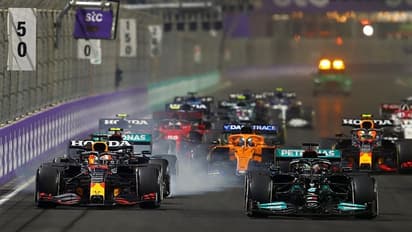Formula 1 unveils exciting 24-race calendar for 2024 Season: New venues, strategic shifts, and more

Synopsis
As the current Formula 1 season wraps up, anticipation builds for the action-packed 2024 F1 season. The upcoming calendar promises a record-breaking 24 races, commencing on 29 February in Bahrain.
As the current Formula 1 season reaches its conclusion, enthusiasts are eager to know about the races lined up for the next year. The 2023 Formula 1 season concluded with Max Verstappen's dominating performances for Red Bull in 22 action-packed races. The anticipation for the 2024 F1 season is building up, set to kick off on 29 February and extend until 8 December, featuring an unprecedented 24-race season. Pre-season testing is scheduled in Bahrain at the end of February, just a week before the inaugural race.
Notably, the first two races in Bahrain and Saudi Arabia will be held on Saturday nights due to a modified schedule during the Muslim holy period of Ramadan, starting on 10 March.
The Chinese Grand Prix makes a return to the F1 calendar after a hiatus since 2019, following the cancellation in 2023 due to stringent COVID-19 measures.
When is the Next F1 Race?
The next F1 race is slated for 2 March 2024, taking place in Bahrain as the season opener. Pre-season testing will precede the event, starting on 21 February and concluding on 23 February, with the Bahrain Grand Prix's FP1 beginning a week later.
What is the 2024 F1 Schedule?
The 2024 F1 season commences officially on 29 February in Bahrain, featuring a comprehensive calendar of 24 races. The FIA's effort to regionalise the schedule aims to enhance the sport's sustainability. The calendar includes familiar tracks as well as new and existing venues, aligning with Formula 1's commitment to Net Zero 2030.
Stefano Domenicali, President and CEO of Formula 1, expressed delight at the 2024 calendar, emphasising the balance between traditional races and new venues. Noteworthy changes include the Japanese Grand Prix moving to April and the Azerbaijan Grand Prix relocating to the second half of the year.
The Qatar Grand Prix also shifts to the penultimate race of the season, aiding logistical considerations for the season finale in Abu Dhabi and addressing the heat challenges faced by drivers in the previous year. The strategic adjustments aim to create an exciting and sustainable season for Formula 1 fans globally.
Also Read: Max Verstappen seals record-breaking F1 season with Abu Dhabi grand prix victory
Stay on top of all the latest Sports News, including Cricket News, Football News, WWE News, and updates from Other Sports around the world. Get live scores, match highlights, player stats, and expert analysis of every major tournament. Download the Asianet News Official App from the Android Play Store and iPhone App Store to never miss a sporting moment and stay connected to the action anytime, anywhere.